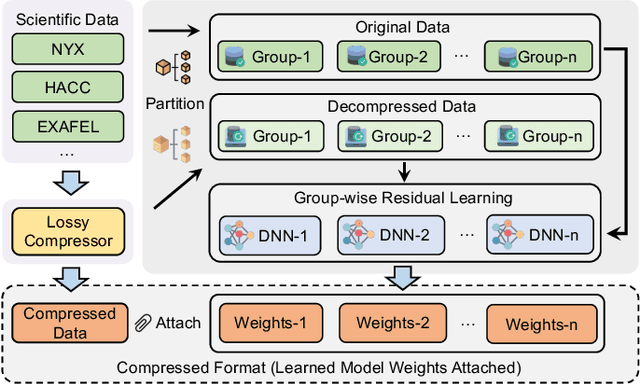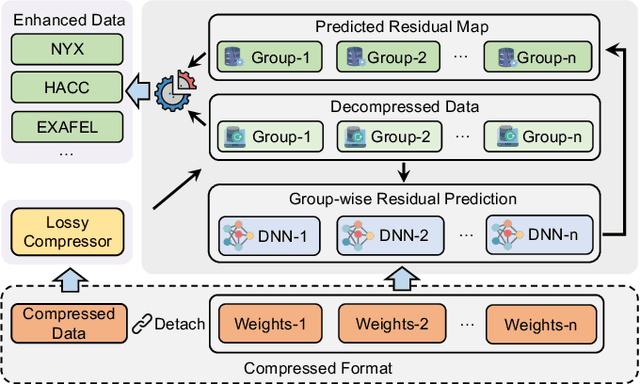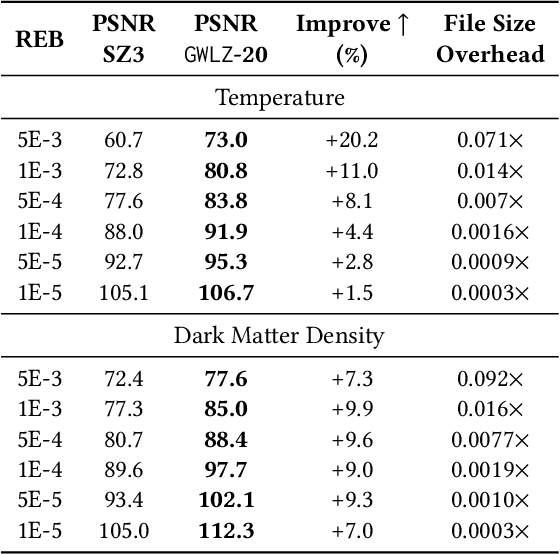Jinzhen Wang
DeepCQ: General-Purpose Deep-Surrogate Framework for Lossy Compression Quality Prediction
Dec 24, 2025Abstract:Error-bounded lossy compression techniques have become vital for scientific data management and analytics, given the ever-increasing volume of data generated by modern scientific simulations and instruments. Nevertheless, assessing data quality post-compression remains computationally expensive due to the intensive nature of metric calculations. In this work, we present a general-purpose deep-surrogate framework for lossy compression quality prediction (DeepCQ), with the following key contributions: 1) We develop a surrogate model for compression quality prediction that is generalizable to different error-bounded lossy compressors, quality metrics, and input datasets; 2) We adopt a novel two-stage design that decouples the computationally expensive feature-extraction stage from the light-weight metrics prediction, enabling efficient training and modular inference; 3) We optimize the model performance on time-evolving data using a mixture-of-experts design. Such a design enhances the robustness when predicting across simulation timesteps, especially when the training and test data exhibit significant variation. We validate the effectiveness of DeepCQ on four real-world scientific applications. Our results highlight the framework's exceptional predictive accuracy, with prediction errors generally under 10\% across most settings, significantly outperforming existing methods. Our framework empowers scientific users to make informed decisions about data compression based on their preferred data quality, thereby significantly reducing I/O and computational overhead in scientific data analysis.
Rethinking the Potential of Layer Freezing for Efficient DNN Training
Aug 20, 2025Abstract:With the growing size of deep neural networks and datasets, the computational costs of training have significantly increased. The layer-freezing technique has recently attracted great attention as a promising method to effectively reduce the cost of network training. However, in traditional layer-freezing methods, frozen layers are still required for forward propagation to generate feature maps for unfrozen layers, limiting the reduction of computation costs. To overcome this, prior works proposed a hypothetical solution, which caches feature maps from frozen layers as a new dataset, allowing later layers to train directly on stored feature maps. While this approach appears to be straightforward, it presents several major challenges that are severely overlooked by prior literature, such as how to effectively apply augmentations to feature maps and the substantial storage overhead introduced. If these overlooked challenges are not addressed, the performance of the caching method will be severely impacted and even make it infeasible. This paper is the first to comprehensively explore these challenges and provides a systematic solution. To improve training accuracy, we propose \textit{similarity-aware channel augmentation}, which caches channels with high augmentation sensitivity with a minimum additional storage cost. To mitigate storage overhead, we incorporate lossy data compression into layer freezing and design a \textit{progressive compression} strategy, which increases compression rates as more layers are frozen, effectively reducing storage costs. Finally, our solution achieves significant reductions in training cost while maintaining model accuracy, with a minor time overhead. Additionally, we conduct a comprehensive evaluation of freezing and compression strategies, providing insights into optimizing their application for efficient DNN training.
NeurLZ: On Enhancing Lossy Compression Performance based on Error-Controlled Neural Learning for Scientific Data
Sep 10, 2024Abstract:Large-scale scientific simulations generate massive datasets that pose significant challenges for storage and I/O. While traditional lossy compression techniques can improve performance, balancing compression ratio, data quality, and throughput remains difficult. To address this, we propose NeurLZ, a novel cross-field learning-based and error-controlled compression framework for scientific data. By integrating skipping DNN models, cross-field learning, and error control, our framework aims to substantially enhance lossy compression performance. Our contributions are three-fold: (1) We design a lightweight skipping model to provide high-fidelity detail retention, further improving prediction accuracy. (2) We adopt a cross-field learning approach to significantly improve data prediction accuracy, resulting in a substantially improved compression ratio. (3) We develop an error control approach to provide strict error bounds according to user requirements. We evaluated NeurLZ on several real-world HPC application datasets, including Nyx (cosmological simulation), Miranda (large turbulence simulation), and Hurricane (weather simulation). Experiments demonstrate that our framework achieves up to a 90% relative reduction in bit rate under the same data distortion, compared to the best existing approach.
GWLZ: A Group-wise Learning-based Lossy Compression Framework for Scientific Data
Apr 20, 2024



Abstract:The rapid expansion of computational capabilities and the ever-growing scale of modern HPC systems present formidable challenges in managing exascale scientific data. Faced with such vast datasets, traditional lossless compression techniques prove insufficient in reducing data size to a manageable level while preserving all information intact. In response, researchers have turned to error-bounded lossy compression methods, which offer a balance between data size reduction and information retention. However, despite their utility, these compressors employing conventional techniques struggle with limited reconstruction quality. To address this issue, we draw inspiration from recent advancements in deep learning and propose GWLZ, a novel group-wise learning-based lossy compression framework with multiple lightweight learnable enhancer models. Leveraging a group of neural networks, GWLZ significantly enhances the decompressed data reconstruction quality with negligible impact on the compression efficiency. Experimental results on different fields from the Nyx dataset demonstrate remarkable improvements by GWLZ, achieving up to 20% quality enhancements with negligible overhead as low as 0.0003x.
 Add to Chrome
Add to Chrome Add to Firefox
Add to Firefox Add to Edge
Add to Edge